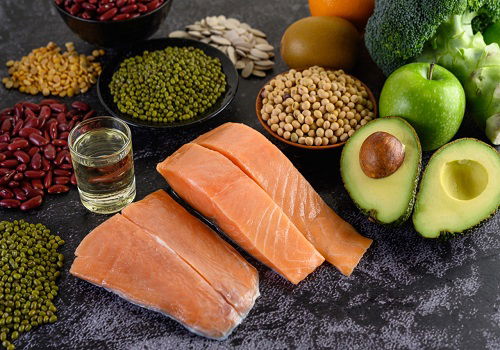
Are one’s Vitamin-D levels related to COVID-19? Can consuming Vitamin-D rich foods reduce the chances of contracting COVID-19 or the risk of complications? These questions keep popping up in relation to the ongoing COVID-19 pandemic and taking precautions to reduce the risk of contracting the deadly virus. Let us delve deeper and find answers to these questions.
The General Importance of Vitamin-D
Vitamin-D, a powerful nutrient, is unlike other essential nutrients and Vitamins. Functioning like hormones, the sunshine Vitamin has receptors in every human cell. It, thus, impacts several organ systems in our body including skeletomuscular, cardiovascular, respiratory, immune and the nervous system to name a few. Vitamin-D helps in calcium and phosphorus absorption, immunomodulation, behavior and emotion regulation, among others. In effect, blood levels of Vitamin-D affect and influence our physical, mental and emotional health.
Poor Vitamin-D levels predispose individuals to the high risk of developing chronic/ life-threatening conditions such as:
- Osteoporosis
- Arthritis
- Chronic pain and bone loss
- Autoimmune conditions such as Lupus and Multiple Sclerosis
- Respiratory Illnesses
- Prostate Cancer
- Breast Cancer
- Diabetes
- Hypertension
- Cardiovascular diseases such as congestive heart failure, strokes, peripheral arterial diseases and so on.
- Dementia
- Schizophrenia
- Depression and other mental health issues.
Can Vitamin-D Prevent or Cure COVID-19?
Right from the pre-COVID-19 era, it was known that Vitamin-D sufficiency can help prevent exacerbation/ reduce the risk of developing a whole range of respiratory illnesses such as Tuberculosis, Asthma, Bronchitis, Pneumonia, etc. This is because Vitamin-D modulates the role of the immune cells in fighting inflammation, rather than suppressing their activity. When there are viral and/or bacterial stimuli, the synthesized Vitamin-D in our body secretes antimicrobial peptides. This strengthens the mucosal defenses, helps fight respiratory pathogens and effectively fight inflammation caused even by acute infections in the respiratory tracts.
Recent studies have found that the immunomodulation role of Vitamin-D helps the body to avoid the COVID-19 Cytokine storms. Cytokine storms are the hyperinflammatory conditions causing the immune system to attack the healthy cells in the body. In the case of COVID-19, the cytokine storms erode healthy blood cells, cause liver damage and block healthy blood flow to different body parts causing permanent damage and even death.
Research from across the globe is consistently finding a strong correlation between Vitamin-D levels in the human body and the severity of COVID-19 infection. Individuals with Vitamin-D Deficiency are at a higher risk of developing complications from COVID-19, including cytokine storms and death. For instance, one research found that in countries like Italy and Spain where the mean Vitamin-D levels in the body are lower, have seen higher death rates in comparison to the Nordic countries where the mean Vitamin-D concentration is higher.
That being said, it must be highlighted here that there is no evidence that Vitamin-D sufficiency can help prevent COVID-19 altogether or cure an affected individual. Vitamin-D sufficiency gives the individual a survival edge by reducing the risk of complications and death, as well as, the severity of infection.
The Best Source of Vitamin-D
The best source of Vitamin-D is good old sunlight! Our body naturally synthesizes Vitamin-D when our skin is exposed to Ultraviolet-B (UVB) rays of sunlight. Skin must be safely exposed to sunlight without sunscreen lotions to absorb sufficient UVB rays. The UVB rays, then, react with our body cholesterol to produce Vitamin-D.
Remember that safe exposure is important. Excessive exposure to sunlight increases the risk of developing skin cancer. It is best to consult with your doctor about the necessary duration of exposure for different times of the year.
7 Vitamin-D Rich Foods to Add to Your Diet
Owing to different factors such as lifestyle changes, geographical limitations, age, medical complications, skin complexion, etc., not everyone can get the requisite amount of Vitamin-D through just sun exposure. In such cases, it is important to supplement our diet with Vitamin-D rich foods, especially now as a COVID-19 precaution.
Here are 7 Vitamin-D rich foods to add to your diet to improve your fighting chances against the deadly SARS-CoV-2.
Oily Fish
Oily/fatty fish like salmon, mackerel, sardines, herring, tuna, etc. are a rich source of Vitamin-D. It is best to consume wild fish, rather than farmed ones as there is a significant difference in the amount of Vitamin-D each contains. For instance, it was found that farmed salmon contains only 25% of the Vitamin-D content of wild salmon (988 IU per 100 g serving).
Oily fish can be consumed in cooked, canned, smoked or pickled form. However, pickled fish does contain high amounts of Sodium, which can lead to other health complications. Canned fish may contain higher Oily/fatty fish like salmon, mackerel, sardines, herring, tuna, etc. are a rich source of Vitamin-D. It is best to consume wild fish, rather than farmed ones as there is a significant difference in the amount of Vitamin-D each contains. For instance, it was found that farmed salmon contains only 25% of the Vitamin-D content of wild salmon (988 IU per 100 g serving).
Oily fish can be consumed in cooked, canned, smoked or pickled form. However, pickled fish does contain high amounts of Sodium, which can lead to other health complications. Canned fish may contain higher
- Egg Yolk
Whole eggs are power packed with many essential nutrients and should be a part of your diet if you are not fond of/ do not consume seafood and meat. While the egg whites are packed with proteins, the yolks contain Vitamin-D, Omega-3 fats, other vitamins, folates and minerals.
The amount of Vitamin-D in egg yolks is dependent on the level of sun exposure of the chicken and the Vitamin-D content in the chicken feed. The egg yolks of farm-raised chickens that are exposed to sunlight have been found to have 3-4 times higher Vitamin-D content than those raised indoors. The egg yolks of chickens fed with Vitamin-D enriched feed have 7 times higher Vitamin-D content.
Mushroom
The only naturally occurring plant source of Vitamin-D is mushrooms. Like human beings and animals, they naturally synthesize Vitamin-D from UVB in the sunlight. Only wild mushrooms and UV-treated mushrooms provide good amounts of Vitamin-D. Commercially produced mushrooms are often grown in the dark and have negligible or no Vitamin-D in them.
Beef Liver and Offal
Beef liver is known to contain good amounts of Vitamin-D, Vitamin-A, proteins, etc. However, exercise caution in consuming beef liver as it is high in cholesterol.
Meat offal (kidneys, liver, etc.) has been found to have a higher concentration of Vitamin-D than muscle meat. Remember that the concentration of Vitamin-D will depend on the Vitamin-D content in animal feed, amount of sun exposure
Fortified Foods and Dairy Products
Natural sources of Vitamin-D for non-meat eaters (vegans and vegetarians) and those with dietary restrictions/ allergies/ medical complications are limited. This is where Vitamin-D fortified foods and dairy products come in. In Nordic countries, for instance, there is government policy related to Vitamin-D supplementation from fortified foods.
A wide of Vitamin-D enriched/ fortified foods are available in the market today such as:
- Breakfast cereals
- Orange juice
- Cow’s Milk
- Cheese
- Oatmeal and so on.
Almond/ Soy MilkAlmond and soy milk fortified with Vitamin-D are available in the market for vegans to supplement themselves with both Vitamin-D and Calcium.
Cod Liver Oil and Other Supplements
A popular supplement, Cod Liver Oil is an excellent source of Vitamin-D for non-meat eaters. Just 1 tsp of Cod Liver Oil is known to contain 448 UI of Vitamin-D.
Apart from these foods, you can also consider taking holistic multivitamins or targeted Vitamin-D supplements to meet your Vitamin-D.
Note: Remember that Vitamin-D toxicity resulting from excessive Vitamin-D intake is dangerous too. It is always best to start taking Vitamin-D supplements after consulting your doctor.
In Conclusion
Vitamin-D does not inhibit the human body from contracting COVID-19. However, Vitamin-D deficiency does significantly increase an individual’s risk of developing severe complications including cytokine storms, organ damage and death. Achieving Vitamin-D sufficiency through safe sun exposure, Vitamin-D rich food consumption and Vitamin-D supplementation is necessary to improve your bodily defenses in the current scenario. This is a COVID-19 precaution along with social distancing and wearing masks.
Are you taking this critical COVID-19 precaution?
